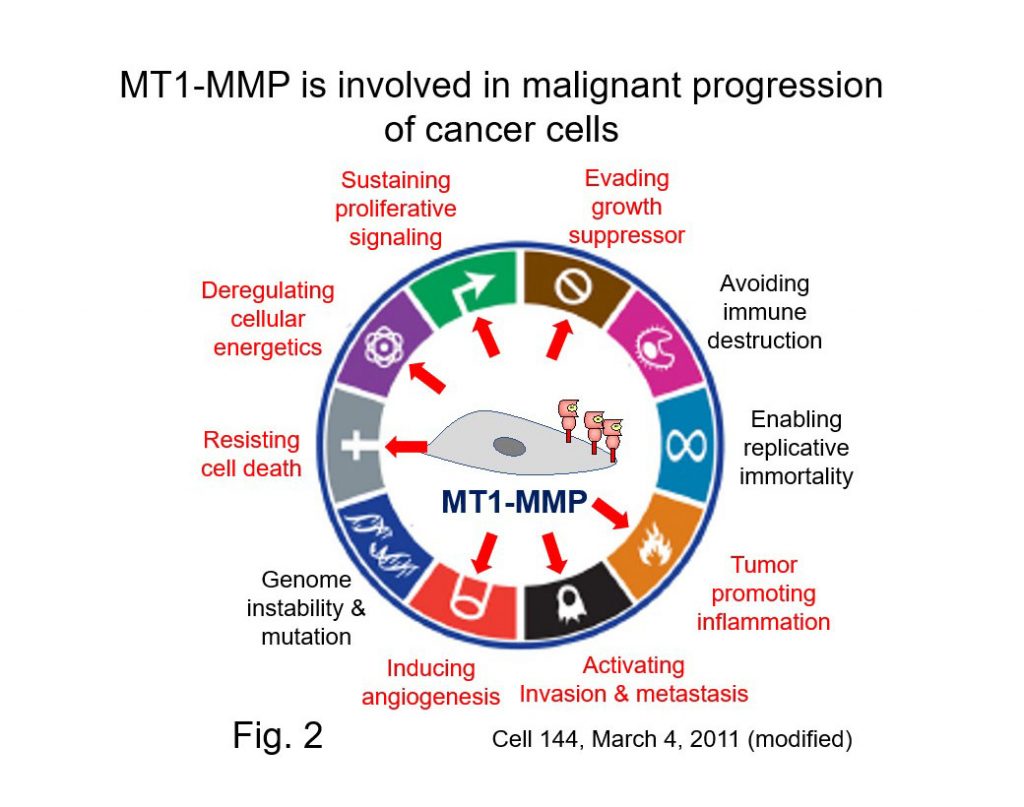Greeting
Welcome to The Koshikawa Lab website!
Our lab is located at the Department of Life Science and Technology, Tokyo Institute of Technology, Yokohama, Japan.
We are working to elucidate the molecular mechanisms of the malignant progression of cancer promoted by extracellular matrices and extracellular matrix proteinases, using several technologies.
Professor Naohiko Koshikawa, PhD
Introduction to our research
To understand the mechanisms of malignant progression of cancer cells induced by membrane-type matrix metalloproteinases (MT-MMPs), we have consistently focused on membrane-type 1 matrix metalloproteinase (MT1-MMP) proteolysis using different technologies. Our goal is to develop innovative diagnostics and therapeutics targeting MT1-MMP and its related molecules.
MT1-MMP was identified as a membrane-type metalloprotease in 1994, in Japan. Since MT1-MMP is highly expressed in invasive cancers, and can degrade collagen type IV in basement membranes by activating the MMP2 precursor for basement membrane disruption by invading cancer cells, MT1-MMP was believed to be a driving force for cancer metastases and invasion (Fig. 1). Recently, MT1-MMP has been shown to be involved in not only cancer metastases and invasion but also the malignant progression of cancer cells (Fig. 2). Therefore, understanding the molecular mechanisms of cancer cell malignant progression regulated by MT1-MMP can lead to the development of new cancer therapies, diagnostics, and drugs.


Thus, we are focusing on a third MT1-MMP substrate and systematically investigating the possibility that partial cleavage (processing) of the substrate is involved in regulating new functions of membrane proteins (Fig. 2).
We have found that MT1-MMP at the cancer cell membrane i) interacts with a membrane-type growth factor and the tyrosine kinase receptor, which play critical roles in the transition of malignant signaling in cancer cells (Cancer Sci 2008); ii) enhances cancer malignant potential by processing and regulating the activity of these membrane proteins (Cancer Res 2010, 2015); and iii) produces a cancer-specific fragment(s) which is a specific biomarker for cancer diagnosis or a therapeutic target (Cancer Sci 2011, Cell Death & Diseases 2017).
These results strongly suggest that MT1-MMP, which is a powerful driving force of invasion and metastasis, contributes to the malignant progression of cancer cells by regulating the function of membrane proteins, and provides a new target for cancer therapy and diagnostics.
At present, we are advancing translational research based on the findings of basic research to date, and we will disseminate our original cancer treatment and diagnostics to society by determining the clinical usefulness (Proof of Concept: POCs) of seeds targeting MT1-MMP and related molecules.




